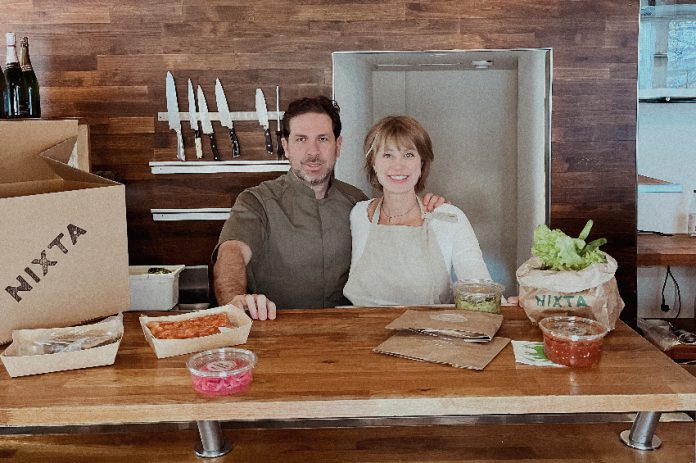Move over, Swedish meatballs, the tinga is here.
In this profile we sit down (virtually) with Frida and Guillermo Obregón, the Mexican-Swedish couple bringing a whole new level of authenticity, sustainability and warmth to Sweden’s beloved “Taco Friday”. This is a treasured 30 year-old tradition, known as Fredagsmys (“cozy Fridays”), when families stay in, watch TV, and enjoy Tex-Mex-style tacos.
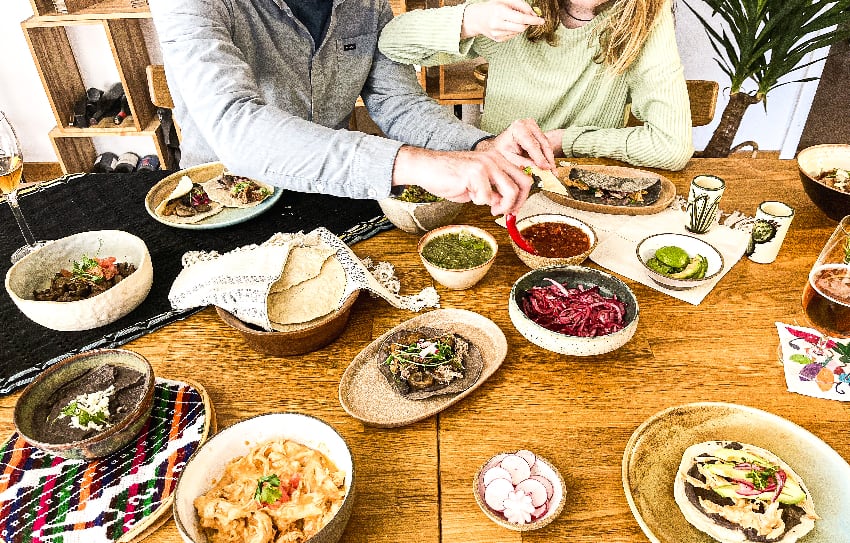
With their mission to bring true Mexican spirit, flavors, and traditions to Swedish palates, Frida and Guillermo, alongside their two young children, are breaking the mold.
Their digital restaurant, Nixta (named after the corn flour-making process of nixtamalización), prepares and delivers authentic Mexican tacos to people’s homes in the province of Scania. Will they succeed in winning over the hearts – and stomachs – of the Swedish people?
Where did the idea of setting up a Mexican taco company in Sweden come from?
Guillermo: I’ve been in the food service industry for over 20 years, and food has always been a passion of mine. Last year, I was working on a delivery-only food concept in Sweden that evolved into delivering Mexican food. Being from Mexico City, the taco capital of the world, and coming from a family that made fresh tortillas daily, it was something close to my heart. When I learned about the Swedish tradition of “Taco Friday,” I saw an opportunity to introduce Swedes to the authentic taste of Mexican tacos and the incredible culinary and cultural rituals that go along with them. To be honest, I’m still trying to get my head around the ‘Swedish taco’ that’s so beloved here, because it’s not the typical taco that I’m used to. It’s not even a Tex-Mex taco, it’s something very unique to their Friday tradition and tastes.
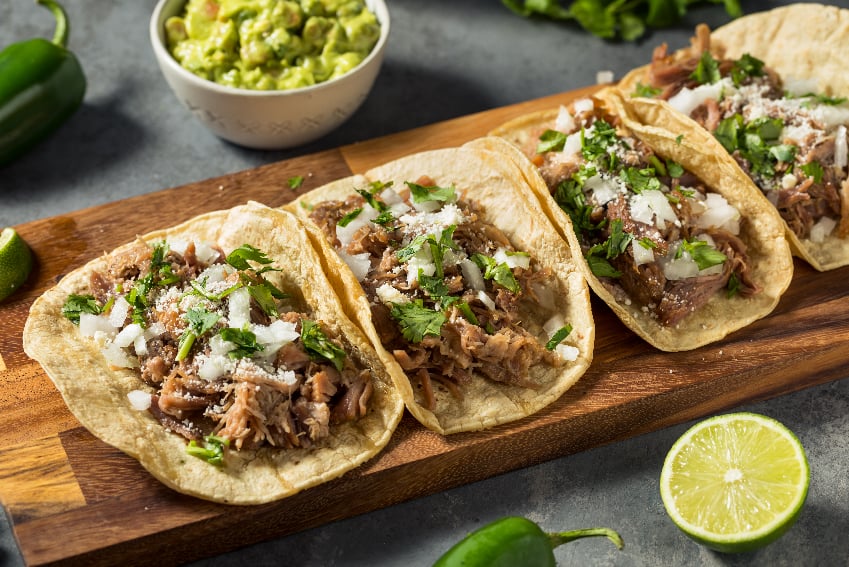
Frida: As a Swede, I grew up with the tradition of “Taco Friday,” which is a bit different from the Mexican tacos we know and love. It’s been around for about 30 years, and being Swedish, the tradition hasn’t changed much. Their taco is more like a burrito, with minced beef, flour or hard-shelled tortillas, a shop-bought spice mix and toppings rarely served with tacos outside of Scandinavia, like cucumber, yogurt and peanuts. I have memories of eating them from as early as four years old. We wanted to infuse the warmth and fun spirit of Mexican culture into the Swedish culinary scene, and bring a touch of excitement to this predictable Friday night routine.
What do you think Mexican culinary culture could bring to Swedish culture?
Frida: I’ve always thought that food is a way of bringing people together, and Mexican meals are lively, filled with conversation and laughter. When we came to Sweden, we wanted to share that same sense of warmth and community through our food. Our aim is to make our food accessible, fun, and easy to bring the family together.
Guillermo: Mexican cuisine is known for its bold flavors and spices, which we believe can add some excitement and variety to the more subtle flavors of Swedish food. We hope to create a more inclusive environment around food and make lasting memories around the dinner table.
Have the Swedes been warming up to your authentic Mexican tacos?
Guillermo: Well, at first I thought it would be easy. There was already a desire and a long-loved tradition in place for “Mexican” food, so I imagined we’d just give them a taste of delicious authentic Mexican food and they’d go for it. But I was wrong! Not everyone seems ready to make changes to this tradition and surprise their taste buds quite yet. We’re trying to respect the beloved Swedish “Taco Friday”, while giving them a taste of authentic Mexican cuisine, where tacos originated, and a glimpse into the rich culinary culture of Mexico.
Frida: It’s been a fun challenge. Some people even told us to call our tacos something else, as they’re not the tacos they’re used to! But most people love the nuanced flavors that come with the many different spices of Mexican food. Our cochinita pibil and carnitas have done well, and we are working to adjust the salsas to Swedish palates.
Can you tell us a little about your backgrounds – how did you meet?
Frida: I’m Swedish and come from a long line of farmers. I left just before my 16th birthday, as my parents moved to the US for work. And then I met Guillermo at university in the UK, where we were both studying Master’s degrees in sustainability. We worked in London together for a bit and bonded over good food. But as you may know, the food in the UK isn’t always as tasty as that in Mexico, so Guillermo sealed the deal after he took me to the Pacific coast and introduced me to Mexican mariscos and clamatos….after that, my life was changed forever.

Guillermo: I was born and raised in Mexico City and I always wanted to show Frida where I came from, knowing she’d love Mexican food and its fun, carefree culture. So, we left England for Mexico, got married on the Pacific Coast, then lived in Mexico City for a few years, and moved to San Miguel de Allende to start a family.
And why did you decide to move to Sweden?
Frida: It was always in the back of my mind to return to Sweden someday. After spending much of my life in other countries, including Mexico, I wanted to share my Swedish heritage with Guillermo and our kids. I wanted them to experience the culture firsthand, to live it and to understand the differences and appreciate them, to grasp why I am the way I am. The pandemic really accelerated our decision-making process. It wasn’t an easy decision to leave the life we’d built in Mexico, but it felt like the right time to take the leap.
Guillermo: The pandemic really forced us to take a step back and reevaluate our priorities. We had a successful business selling gourmet popcorn, popcorn machines and consulting for the cinema industry, but when that industry disappeared overnight, we realized we needed to make a change – it made us realize how outside circumstances can change everything and trigger new opportunities. We didn’t want to be tied down to anything in Mexico, so we sold our gelato and popcorn businesses and started looking for a way to move to Sweden.
What were some of the cultural differences and challenges you faced when settling into your new home?
Frida: For me, the biggest difference was the need to establish a routine quickly. Swedish society is very focused on being productive and finding work as soon as possible. We definitely felt the social pressure to quickly get our kids into school and to actively search for work.
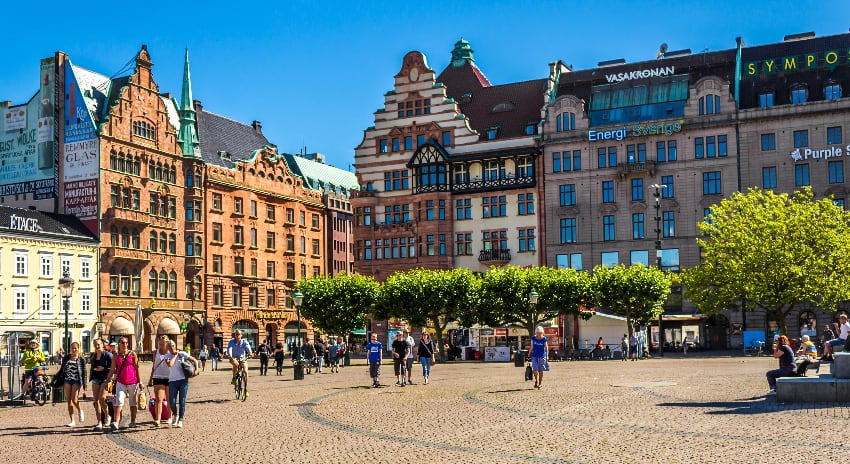
Guillermo: Yes, the pressure to find work was definitely something we noticed. In Sweden, there’s a strong emphasis on individual responsibility and contributing to society. It was a big cultural shift for us coming from Mexico, where there’s more emphasis on family and community support.
Frida: Another cultural difference we noticed was the way Swedes have more social constraints than in Mexico – it’s not exactly a spontaneous country like Mexico, so we didn’t feel as free to do what we wanted to do, whenever we wanted to do it!
Have these differences made it a challenge to set up a food business in Sweden?
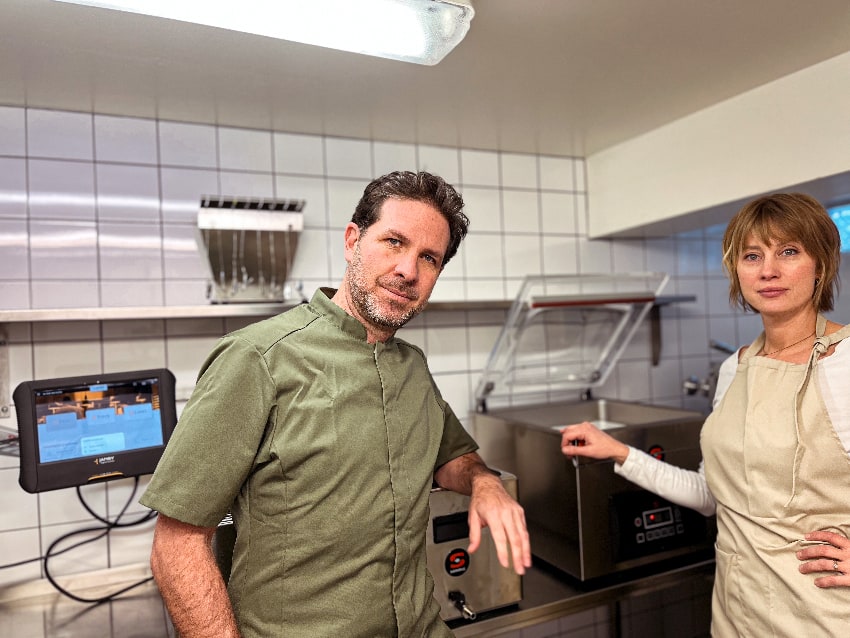
Guillermo: The Swedish approach to cooking is very systematic, and they prefer to have the same meal certain days of the week – hence ‘Taco Fridays’. They find comfort in familiar dishes, which can be challenging for us since we specialize in Mexican cuisine, known for its spontaneity and variety. We believe that the positive aspect of Mexican cuisine is that it’s exciting, surprising, and diverse, whereas the Swedes prefer safe and comforting dishes.
Frida: When we started our digital restaurant, we knew that it would be a challenge to introduce authentic Mexican cuisine to Sweden. We had to find a balance between staying true to the core of Mexican cuisine while catering to Swedish tastes. We’ve learned that not everyone will appreciate the new flavors, levels of spiciness, and concepts that we bring, but we focus on finding the customers who are open and willing to try something new. We’re happy to see that some Swedish people are excited to evolve and change their traditional ‘Taco Fridays’ to become more authentic. Sourcing is also very important to us, and we use as much local produce as we can, as well as only local meats. We do import heirloom Mexican corn to make tortillas de maíz, however.
What are some of the highs and lows of living and working in Sweden compared to Mexico?
Guillermo: I never thought I would say this, but Sweden’s predictability and structure are actually a game-changer for me and my family. Growing up in Mexico, I always felt like we had to watch our backs, especially when we started a family. But here, I can breathe easy knowing that my kids can walk to school alone without any worries. It’s a real gift.
Frida: I couldn’t agree more. Having this kind of safety and predictability is something I never knew I needed until I experienced it. But at the same time, I do miss the surprise and magic of Mexican culture. The spontaneous parties, the vibrant colors, and the sense of adventure that comes with not knowing what’s going to happen next. Sometimes I feel like Sweden’s structure can be a little too confining and restrictive, but I guess that’s the trade-off for feeling safe and secure.
So, what’s next for you and your family?
Frida: A trip back to Mexico this summer to lie in a hammock on the beach, sipping a cold michelada and eating delicious Mexican seafood and tacos – purely for market research!
Guillermo: The same!
